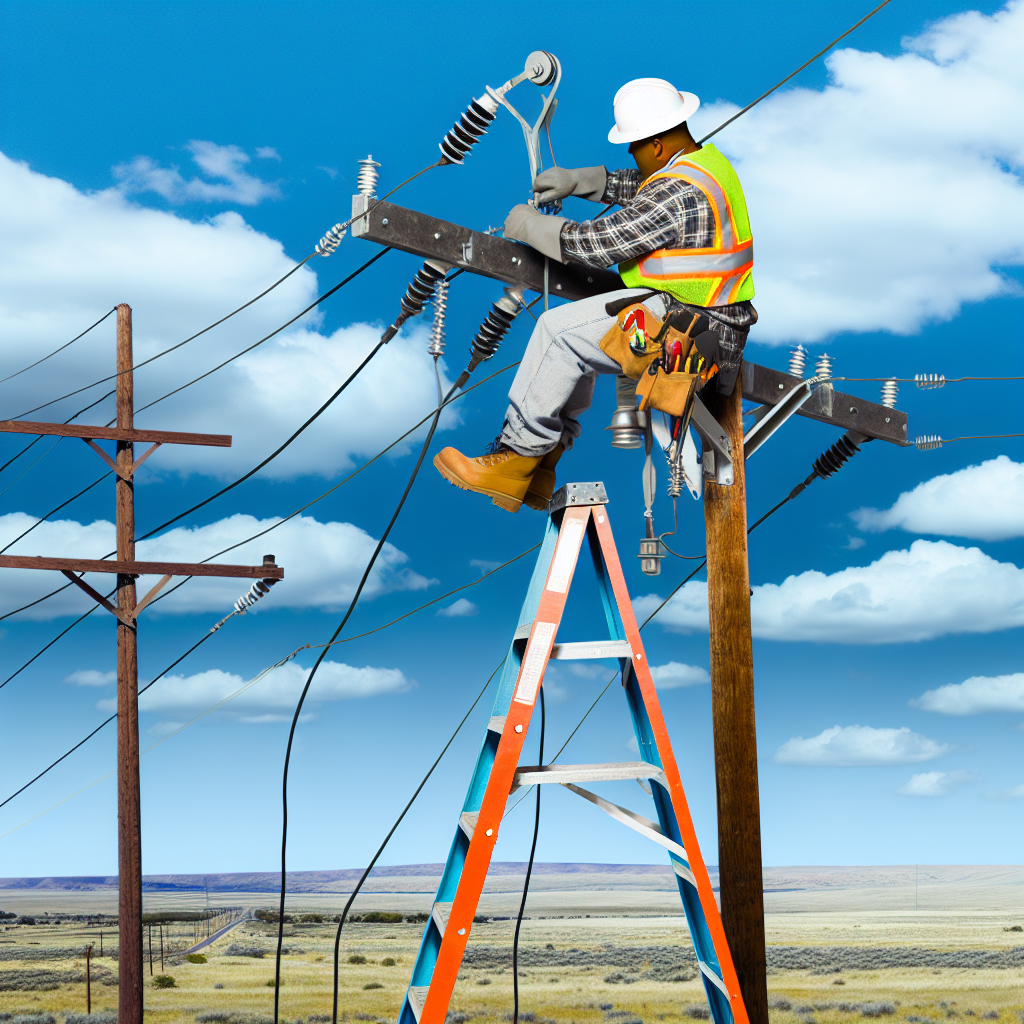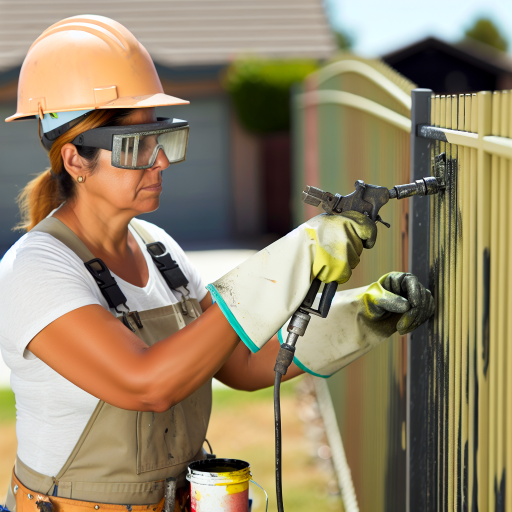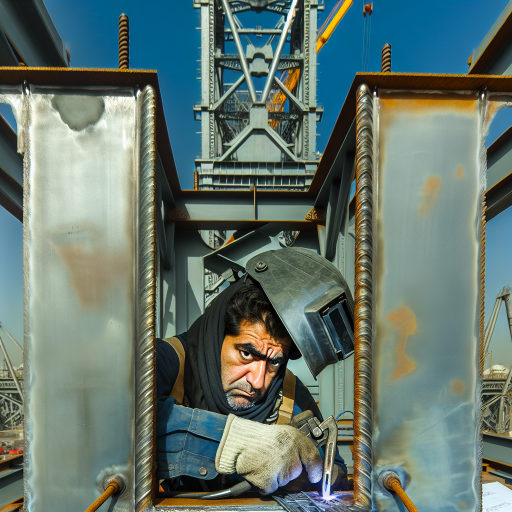Introduction:
Power line installers play a vital role in ensuring the infrastructure of the country by installing and maintaining power lines.
These professionals work tirelessly to ensure that homes, businesses, and industries have access to electricity.
Without power line installers, the functioning of our society would be severely impacted, highlighting the importance of their work.
Job Description:
– Installing and repairing power lines
– Working with transformers and other electrical equipment
– Following safety protocols
– Working in various weather conditions
Installing and Repairing Power Lines
Power line installers are responsible for installing and repairing power lines that provide electricity to homes, businesses, and other structures.
They work with a team to safely and efficiently install new lines or fix existing ones.
Working with Transformers and Electrical Equipment
In addition to power lines, installers also work with transformers and other electrical equipment.
They must have a solid understanding of how these components work and be able to troubleshoot any issues that may arise during installation or repair.
Following Safety Protocols
Safety is a top priority for power line installers.
They must adhere to strict safety protocols to prevent accidents and injuries.
This includes wearing proper safety gear, using insulated tools, and following established procedures for working with electricity.
Working in Various Weather Conditions
Power line installers often work outdoors and must be prepared to face various weather conditions.
Whether it’s scorching heat, heavy rain, or freezing temperatures, installers must be able to adapt and continue working safely and effectively.
Being a power line installer requires physical strength, technical knowledge, and a strong commitment to safety.
It is a challenging yet rewarding career that plays a crucial role in keeping our communities powered and connected.
Typical Day:
Power line installers start their day bright and early, often before the sun rises.
This is to ensure they have enough time to complete their tasks for the day.
Transform Your Career Today
Unlock a personalized career strategy that drives real results. Get tailored advice and a roadmap designed just for you.
Start NowAfter arriving at the site, the first order of business is checking all equipment and tools.
Safety is a top priority in this line of work, so it’s crucial that everything is in proper working order.
Once the equipment check is complete, the team gathers to plan out the day’s tasks.
This involves determining which power lines need to be installed or repaired and mapping out the most efficient way to accomplish these goals.
Communication is key in this line of work, so team members discuss the plan of action for the day.
Each member has a specific role to play, and clear communication ensures that everyone is on the same page.
As the day gets underway, power line installers begin their tasks.
This could involve climbing poles, installing transformers, or repairing damaged lines.
Each task requires precision and attention to detail to ensure the job is done correctly.
Throughout the day, installers must be constantly aware of their surroundings.
Working with electricity is dangerous, so they must always be mindful of safety protocols and procedures to prevent accidents.
In addition to physical labor, power line installers also need to be able to troubleshoot and problem-solve.
If they encounter any issues during the day, they must be able to think quickly and find solutions to keep the project on track.
Weather conditions can also play a significant role in the day-to-day work of power line installers.
Rain, snow, or extreme heat can all impact their ability to work safely and efficiently.
In these cases, they may need to adjust their plans accordingly.
As the day draws to a close, installers wrap up their tasks and ensure that the worksite is clean and secure.
They take inventory of their tools and equipment, readying everything for the next day’s work.
Before heading home, the team gathers once more to debrief on the day’s events.
They discuss what went well, what could be improved, and any issues that arose.
Transform Your Career Today
Unlock a personalized career strategy that drives real results. Get tailored advice and a roadmap designed just for you.
Start NowThis allows them to continuously learn and grow in their roles as power line installers.
Learn More: Health Risks and Solutions for Miners
Job Challenges:
Power line installers face numerous challenges every day as they work to ensure a reliable and safe electrical grid for communities.
From working at dangerous heights to handling live wires, their job is not for the faint of heart.
- Working at heights
- Dealing with live wires
- Handling heavy machinery
- Exposure to harsh weather conditions
Working at Heights:
Working at heights is a significant challenge for power line installers.
They often have to climb high poles or towers to install or repair power lines.
This requires a great deal of physical strength and agility.
Dealing with Live Wires:
One of the most dangerous aspects of a power line installer’s job is working with live wires.
The risk of electrocution is always present, and one wrong move could be fatal.
They must always be vigilant and follow strict safety protocols.
Handling Heavy Machinery:
Power line installers also have to operate heavy machinery, such as cranes and bucket trucks, to access power lines at different heights.
Operating this equipment requires specialized training and can be physically demanding.
Exposure to Harsh Weather Conditions:
Power line installers work outdoors in all kinds of weather conditions, from scorching heat to freezing cold.
They must be prepared to work in extreme temperatures, high winds, and even storms to ensure that the power grid remains operational.
You Might Also Like: Navigating Licensing for Pest Control Jobs
Skills and Qualifications:
Training and certification requirements: Power line installers typically need to complete a formal apprenticeship program or vocational training in electrical systems.
They must also obtain certification from relevant organizations to ensure they meet safety standards.
Knowledge of electrical systems: Power line installers must have a deep understanding of electrical systems, including how to read blueprints, install wiring, and troubleshoot issues.
They need to be familiar with different types of power lines and equipment.
Physical fitness and strength: This job requires power line installers to work at great heights and in various weather conditions.
Transform Your Career Today
Unlock a personalized career strategy that drives real results. Get tailored advice and a roadmap designed just for you.
Start NowThey must have the physical stamina to climb poles, carry heavy equipment, and withstand long hours of physical labor.
Problem-solving skills: Power line installers frequently encounter challenges while installing, repairing, and maintaining power lines.
They must be able to think quickly on their feet, troubleshoot issues, and find solutions to complex electrical problems.
Delve into the Subject: Top 5 Machinist Tools and Their Uses Explained
Career Advancement:
Power line installers have several opportunities for specialization within the field.
They can choose to focus on specific types of installations, such as underground lines or overhead systems.
As power line installers gain experience and expertise, they may be eligible for supervisor or management roles.
These positions involve overseeing installation projects, managing teams, and ensuring that work is completed according to safety and quality standards.
Continuing education and training are essential for power line installers who want to advance their careers.
Many employers offer professional development programs and workshops to help employees stay current with industry trends and technologies.
With career advancement typically comes a higher salary potential.
Power line installers who take on leadership roles or specialize in a particular area of installation often earn more than entry-level workers.
Uncover the Details: Tips for Successful Construction Project Planning

Salary and Benefits:
Power line installers can expect a competitive average salary range.
The average salary for power line installers is around $70,910 per year.
Entry-level positions may start lower but can increase with experience.
In addition to a competitive salary, power line installers often receive excellent benefits.
These benefits may include healthcare coverage for themselves and their families.
Retirement plans such as 401(k) or pension funds are also common benefits.
Another key benefit for power line installers is overtime pay.
Transform Your Career Today
Unlock a personalized career strategy that drives real results. Get tailored advice and a roadmap designed just for you.
Start NowDue to the nature of the job, overtime opportunities can significantly boost earnings.
Power line installers may work long hours during storms or emergencies.
Job stability is another significant benefit of being a power line installer.
Electricity is a vital utility, ensuring a constant need for skilled workers.
With population growth and infrastructure development, job growth opportunities are abundant.
Job Outlook
- Demand for power line installers remains high due to the need for electricity infrastructure.
- Growth in renewable energy projects has also created opportunities for power line installers.
- There is a potential for advancement in the field, with opportunities for specialization and leadership roles.
- Job prospects vary in different regions, with some areas experiencing higher demand for power line installers.
Power line installers play a crucial role in ensuring that electricity is safely and efficiently delivered to homes, businesses, and other facilities.
With the increasing demand for electricity and the push towards renewable energy sources, the job outlook for power line installers is promising.
Let’s take a closer look at the factors that contribute to the positive job outlook for power line installers.
Demand for Power Line Installers
One of the primary factors driving the demand for power line installers is the need to maintain and expand the electricity grid.
As infrastructure ages and populations grow, there is a constant need for new power lines to be installed, existing lines to be repaired, and upgrades to be made to accommodate increased electricity demand.
Additionally, power line installers play a crucial role in ensuring that power outages are minimized.
Their efforts ensure that electricity is delivered safely and reliably to consumers.
Growth in Renewable Energy Projects
Another factor contributing to the positive job outlook for power line installers is the growth in renewable energy projects.
As more governments and organizations commit to reducing carbon emissions and transitioning to clean energy sources, there has been a significant increase in the installation of solar panels, wind turbines, and other renewable energy systems.
Power line installers are responsible for connecting these renewable energy systems to the electricity grid.
They ensure that the energy generated is efficiently distributed to consumers.
Potential for Advancement in the Field
Power line installers also have the potential for advancement in their field.
With experience and additional training, power line installers can specialize in certain types of installations.
These specializations may include underground power lines or high-voltage transmission lines.
They may also have the opportunity to take on leadership roles, supervising teams of installers and coordinating projects.
Transform Your Career Today
Unlock a personalized career strategy that drives real results. Get tailored advice and a roadmap designed just for you.
Start NowFurthermore, as technology continues to advance, power line installers may need to learn new skills to work with smart grid systems.
This constant evolution in the field creates opportunities for power line installers to expand their knowledge and expertise.
Job Prospects in Different Regions
Job prospects for power line installers can vary depending on the region.
Some areas may have a higher demand for power line installers due to population growth, industrial development, or the expansion of renewable energy projects.
In these regions, power line installers may find plentiful job opportunities and competitive salaries.
On the other hand, in regions where electricity infrastructure is well-established, job prospects may be more limited.
In such areas, power line installers may need to be flexible and willing to travel to find opportunities.
By being open to relocating and pursuing job opportunities in different regions, power line installers can expand their career options and increase their earning potential.
The job outlook for power line installers is positive, with high demand for skilled workers.
Factors such as the growth in renewable energy projects, potential for advancement in the field, and job prospects in different regions contribute to the promising career opportunities available.
As the need for electricity continues to grow and evolve, power line installers play a vital role in ensuring delivery is safe and reliable.
Troubleshooting and Repairs
Power line installers are also tasked with troubleshooting and repairing any issues that may arise with the power lines.
This could involve identifying the problem, fixing the issue, and ensuring that everything is back up and running smoothly.
Team Collaboration
Collaboration with other team members is a key aspect of a power line installer's day.
They work together to complete installations, make repairs, and ensure the safety and efficiency of the power lines.
Adherence to Safety Regulations
Safety is paramount in the work of power line installers.
They must adhere to strict safety regulations to prevent accidents and ensure the well-being of themselves and others.
Importance of Power Line Installers
Power line installers play a crucial role in maintaining our power infrastructure.
Their hard work and dedication ensure that we have access to reliable electricity.
If you are interested in pursuing a career in this field, know that your contributions will be highly valued and appreciated.
Transform Your Career Today
Unlock a personalized career strategy that drives real results. Get tailored advice and a roadmap designed just for you.
Start NowAdditional Resources
Electricians : Occupational Outlook Handbook: : U.S. Bureau of …
2.101 Definitions. | Acquisition.GOV
[E-Books for Sale]
The Big Book of 500 High-Paying Jobs in America: Unlock Your Earning Potential
$19.99 • 500 High-Paying Jobs • 330 pages
Explore 500 high-paying jobs in America and learn how to boost your career, earn more, and achieve success!
See All 500 High-Paying Jobs of this E-Book
1001 Professions Without a Degree: High-Paying American Jobs You Can Start Now
$19.99 • 1001 Professions Without a Degree • 174 pages
Discover 1001 high-paying jobs without a degree! Unlock career tips, skills, and success strategies for just $19.99!




